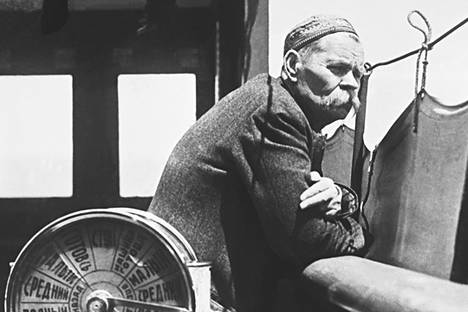| 5 must-read books to understand the Russian Revolution |
| Friday, 07 April 2017 07:07 | |||
|
The Russian Revolution totally reshaped society, and the writers of the day responded to it with a mixture of exhilaration, horror and hope, some changing their views over their lifetimes. Alexander Blok, the poem 'The Twelve'
To begin with, influential lyrical poet Alexander Blok enthusiastically welcomed the revolution, seeing it as the chance to build a new life and an opportunity for spiritual change in society. In his controversial poem “The Twelve” (1918), Blok portrays the revolution as an apocalypse. Petrograd, as St. Petersburg was known in the period 1914-1924, has been half destroyed; devastation and hunger roam its streets, with robberies and shootings commonplace. However, Blok welcomes and justifies the collapse of the old order and the triumph of the new revolutionary forces that have engulfed the country. The twelve of the title are 12 Red Guards, depicted as 12 apostles of the new faith. They casually sacrifice people’s lives on the altar of the new era, describing them as “shackled” and “servile”. Walking ahead of the Red Guards, “in a wreath of white roses”, is Jesus Christ. There are different interpretations of the image of Christ in the poem. Some see Christ as blessing and leading the revolution, while others feel that the Red Guards banish him, destroying his faith. Within a couple of years, however, Blok had become disillusioned with the revolution. He became deeply depressed, stopped writing poetry and died from heart failure in August 1921. Read more about the final days of Alexander Blok here>>> Maxim Gorky, 'The Song of the Stormy Petrel', and other works
Gorky’s relationship with the Russian revolutions of the early 20th century went through several distinct stages. Coming from a humble background himself, he was the natural writer to present the proletarian viewpoint, and works such as The Old Woman Izergil (1894), “The Song of the Falcon” (1895) and “The Song of the Stormy Petrel” (1901) were eagerly taken up by the revolutionary movement. Indeed, the words “born to crawl – cannot fly” from “Falcon” became a widespread catchphrase, and Lenin personally wrote to Gorky to praise the writer’s affinity for the revolution.  Gorky emigrated to Europe in 1921, but he returned to the Soviet Union in 1932 at the government’s invitation. On his return, he endorsed Stalin’s policies and wrote enthusiastically about the achievements of the Soviet system, while mentioning nothing about the purges. Gorky’s private life and work are full of contradictions and still provoke much debate. Mikhail Bulgakov, The White GuardA screenshot from TV series "The White Guard," 2012. Source: kinopoisk.ru Bulgakov was never won over by the revolution, remaining a monarchist to the end. Many of his works were critical, directly or obliquely, of the new societal order, and were banned from print. Despite this, he was never exiled and stayed in the Soviet Union. Bulgakov portrayed his complex, pessimistic view of the revolutionary age in his first novel The White Guard (1924). In this loosely autobiographical work Bulgakov describes his native city Kiev in the grip of the 1918-1919 Civil War, as experienced by White Guard officers from a cultured family. They try to preserve their old way of life as their familiar world crumbles and they are caught up in wider events. Bulgakov depicts the death of Christian culture and the destruction of the educated social class to which the author and his characters belong. All that can save a world teetering on the edge of the abyss is love: love for your fellow man, family, home and country. Mikhail Sholokhov, And Quiet Flows the DonSholokhov was the only writer to receive the Nobel Prize in Literature with the official permission of the Soviet authorities. He was awarded the prize in 1965 for his novel And Quiet Flows the Don (1925-1940), which some readers consider the War and Peace of the 20th century. Sholokhov, who grew up on a Cossack farm, describes the tragic consequences of the revolution and civil war for the Don Cossacks as a whole, as well as every individual family caught in the “millstones of history”. The main protagonist, the Cossack Grigory Melekhov, loves his farm and dreams of a peaceful working life, but has no choice except to go to war. His shifts in political and romantic allegiance reflect the indecision and turmoil in the country at large. Sholokhov himself welcomed Soviet power and espoused rather conservative Communist politics, but he did not shy away from showing the negative sides of the revolutionary years too. He wrote less and less as he got older, eventually moving away from literary work entirely. Boris Pasternak, Doctor Zhivago
Pasternak was awarded the Nobel Prize in Literature for his novel Doctor Zhivago (1957), but the book was banned in the USSR for over 30 years. Through the eponymous character Dr. Yuri Zhivago, Pasternak shows how the complex and ambiguous attitude of the Russian intelligentsia to the revolution evolved over time. At first, like many, Zhivago sees the changes taking place as largely positive: “What splendid surgery! You take a knife and with one masterful stroke you cut out all the old stinking ulcers.” However, he becomes disillusioned when he sees that this is not a Blok-inspired romantic revolution, but rather bloody carnage perpetuated by a soldiery running rampage. He reproaches himself for his “careless admiration” of the new authorities, for which he and the rest of the intelligentsia are now paying. Despite his best efforts, Zhivago finds himself embroiled in the fighting, before fleeing both the Reds and the Whites to write poetry and reevaluate all the events once again. Through this rich, multilayered novel, Pasternak ultimately reaches the conclusion that revolution is a tragedy for humanity, an act of violence against life itself, nature and the natural laws.
|





